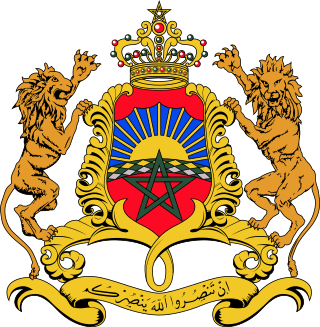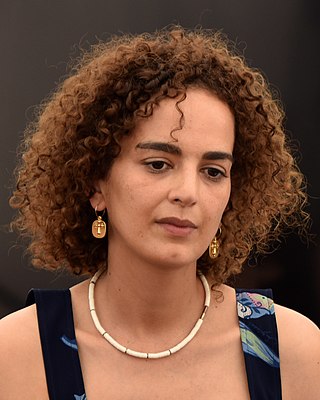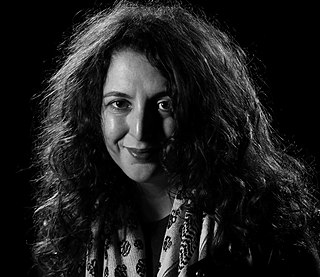Related Research Articles

The 2003 Casablanca bombings, commonly known as May 16, were a series of coordinated suicide bombings on May 16, 2003, in Casablanca, Morocco. Twelve suicide bombers loyal to the Salafia Jihadia organization detonated bombs hidden in backpacks in the Casa de España restaurant, the Hotel Farah, the Jewish Alliance of Casablanca, and sites near the Belgian consulate and an old Jewish cemetery. The attacks, which were later claimed by al-Qaeda, were the deadliest terrorist attacks in Morocco's history, claiming the lives of forty-five people and injuring at least 100. Despite deliberately targeting Jews, none of the victims were Jews as the attack occurred during Shabbat.

Prince Moulay Rachid of Morocco is a member of the Alawi dynasty. He is the fifth child of King Hassan II and his wife, Princess Lalla Latifa. He is currently the 2nd in line for the Moroccan throne, after his nephew Crown Prince Moulay Hassan.

Princess Lalla Meryem is the first daughter and eldest child of the late King Hassan II of Morocco and his wife, Princess Lalla Latifa.

Princess Lalla Asma of Morocco is the second daughter and third eldest child of King Hassan II of Morocco and his wife, Princess Lalla Latifa.
Princess Hajja Lalla Latifa was the wife of King Hassan II of Morocco, and the mother of Princess Lalla Meryem, King Mohammed VI, Princesses Lalla Asma and Lalla Hasna, and Prince Moulay Rachid.
Christine Daure-Serfaty was a French human rights activist and writer who distinguished herself in Morocco where she embraced the fight of the victims of King Hassan II, during the "Years of Lead," and from afar, played a major role in the evolution of the regime and the human rights in Morocco. She was the wife of Abraham Serfaty, a Moroccan dissident. In 1974 Abraham Serfaty was sentenced to life imprisonment. It was in September 1999 that the new Moroccan king, Mohammed VI, permitted Abraham Serfaty’s return to Morocco.
Fouzia Rhissassi is a Moroccan professor of social sciences at the faculty of arts at Ibn Tofail University in Kenitra, Morocco. Currently she holds a position of the UNESCO Chair on Women Rights.
Touria Oulehri is a Moroccan novelist and academic. Her novels focus on the experiences and challenges faced by Moroccan women.
Rita El Khayat also known as "Ghita". Ghita El Khayat,, is Moroccan psychiatrist, anthro-psychoanalyst, writer, and anthropologist. She studied at modern schools of Rabat and completed her graduation in the field of Psychiatry, Psychoanalyst and Medical Aerospace from Paris whereas graduation in Ergonomics and Occupational Medicine were completed from Bordeaux. She did her PhD in Anthropology of Arab World from.
Latifa Labida is a Moroccan politician. Between 2007 and 2012, she was Secretary of State for Education in the cabinet of Abbas El Fassi.

Latifa Akherbach is a Moroccan politician and journalist. Between 2007 and 2012, she was Secretary of State for Foreign Affairs in the cabinet of Abbas El Fassi.
Saida Menebhi was a Moroccan poet, high school teacher, and activist with the Marxist revolutionary movement Ila al-Amam. In 1975, she, together with five other members of the movement, was sentenced for seven years of imprisonment for anti-state activity. On November 8, 1977, inside the jail in Casablanca, she participated in a collective hunger strike, and died on the 35th day of the strike at Avicenne Hospital.

Leïla Slimani is a French-Moroccan writer and journalist. She is also a French diplomat in her capacity as the personal representative of the French president Emmanuel Macron to the Organisation internationale de la Francophonie. In 2016, she was awarded the Prix Goncourt for her novel Chanson douce.
Latifa El Bouhsini is a university professor at the Faculty of Education Sciences in Rabat, and has been a member of the National Office of the School of Citizenship for Political Studies, ECEP, in Rabat since 2012. Bouhsini is also a member of the national office of the Moroccan Organization of Human Rights She is a writer and a leftist feminist activist who holds a PhD in history and civilizations and writes prolifically about the history of the feminist movement in Morocco. Bouhsini is also a trainer specialized in gender and women's rights, and she is a speaker at the National Human Rights Council.
Latifa Jbabdi is a Moroccan feminist activist and writer. She is best known for her work to help improve women's rights through reforming the Mudawana, Morocco's legal code governing family life. She also served as a member of the House of Representatives from 2007 to 2011.

Derb Moulay Cherif is a neighborhood in Hay Mohammadi, Casablanca.

Amina Rachid was a Moroccan actress. She presented more than 60 major theatrical works to the theater and participated in many television works from 1962 until the end of her life. She worked in Moroccan radio as an actress for many years and presented about 3,500 plays, evening shows, and radio series. She excelled in the field of cinema and participated in several famous films.

Sonia Terrab is a Moroccan writer, filmmaker, and activist. Her work revolves around the status of women in Moroccan society, social hypocrisy regarding the body and sexuality, and Moroccan youth.
Layla Chaouni, also known as Layla Chaouni Benabdallah, is a Moroccan publisher and activist for Human and Women's Rights. She is best known as director of her publishing company Éditions Le Fennec, having published more than 500 titles both in French and Arabic.
Khadija Marouazi is a Moroccan human rights activist, writer and university lecturer for literature. Member of several human rights organizations in Morocco, she is also known for her debut novel History of Ash, originally written in Arabic and published in English translation in 2023. This fictional account of political repression during the so-called Years of Lead in Morocco and the traumatic effects on prisoners has been discussed by literary scholars as part of Arab women writers' prison literature.
References
- 1 2 Casti, Danilo (2008-05-16). "Fatna El Bouih «Une femme nommée Rachid»". La Gazette du Maroc. Retrieved 2020-11-14.
- 1 2 Brown, Claudia (2001-04-13). "Morocco's Survivors / Activists shed light on 'dark years". SFGATE. Retrieved 2021-07-16.
- 1 2 Le dictionnaire universel des créatrices. Didier, Béatrice., Fouque, Antoinette., Calle-Gruber, Mireille, 1945-. Paris: Des femmes-A. Fouque. 2013. ISBN 978-2-7210-0631-8. OCLC 864873770.
{{cite book}}: CS1 maint: others (link) - ↑ Bīh, Fāṭinah. (2008). Talk of darkness. Kamal, Mustapha., Slyomovics, Susan. Austin, TX: Center for Middle Eastern Studies at the University of Texas at Austin. ISBN 978-0-292-71915-6. OCLC 271772060.
- ↑ Ghachem, Béchir (2018-06-15). "Genre, mémoire, témoignage. De la violence carcérale de genre dans les années de plomb au Maroc à travers l'écriture testimoniale de Fatna El Bouih". Université Lumière Lyon 2 (in French): 198.
- ↑ Chabaa, Qods (2016-03-18). "Prix Littéraire Sofitel Tour Blanche: Fatna El Bouih remporte le premier Prix". Le 360 (in French). Retrieved 2020-11-14.
- ↑ Palou, Anthony (2016-03-21). "4e édition du Prix littéraire féminin du Sofitel Tour Blanche". Le Figaro (in French). Retrieved 2020-11-14.
- ↑ Orlando, Valérie K. (2010-09-01). "Feminine spaces and places in the dark recesses of Morocco's past: the prison testimonials in poetry and prose of Saïda Menebhi and Fatna El Bouih". The Journal of North African Studies. 15 (3): 273–288. doi:10.1080/13629380902745884. ISSN 1362-9387. S2CID 143905923.